MGT5STR Report: GrainCorp's International Business Strategy Analysis
VerifiedAdded on 2022/11/14
|13
|2964
|5
Report
AI Summary
This report analyzes the international expansion opportunities for GrainCorp, a major Australian agribusiness company. It examines the Australian food-focused agribusiness sector, identifying international opportunities for GrainCorp, and discusses suitable international business strategies, including the international strategy, with a focus on low responsiveness and low global integration. The report suggests a joint venture approach for market entry and recommends collaboration with local producers and traders. The analysis covers GrainCorp's current operations, its strengths in innovation and partnerships, and the broader global agribusiness landscape. The report also assesses different modes of entry into foreign markets, such as exporting and joint ventures, and provides recommendations for GrainCorp's future strategic direction in the international market, emphasizing the importance of maintaining core business principles and fostering local partnerships. The report follows a structured format, including an executive summary, table of contents, and conclusion, and utilizes Harvard referencing with a minimum of eight journal articles and textbook references.
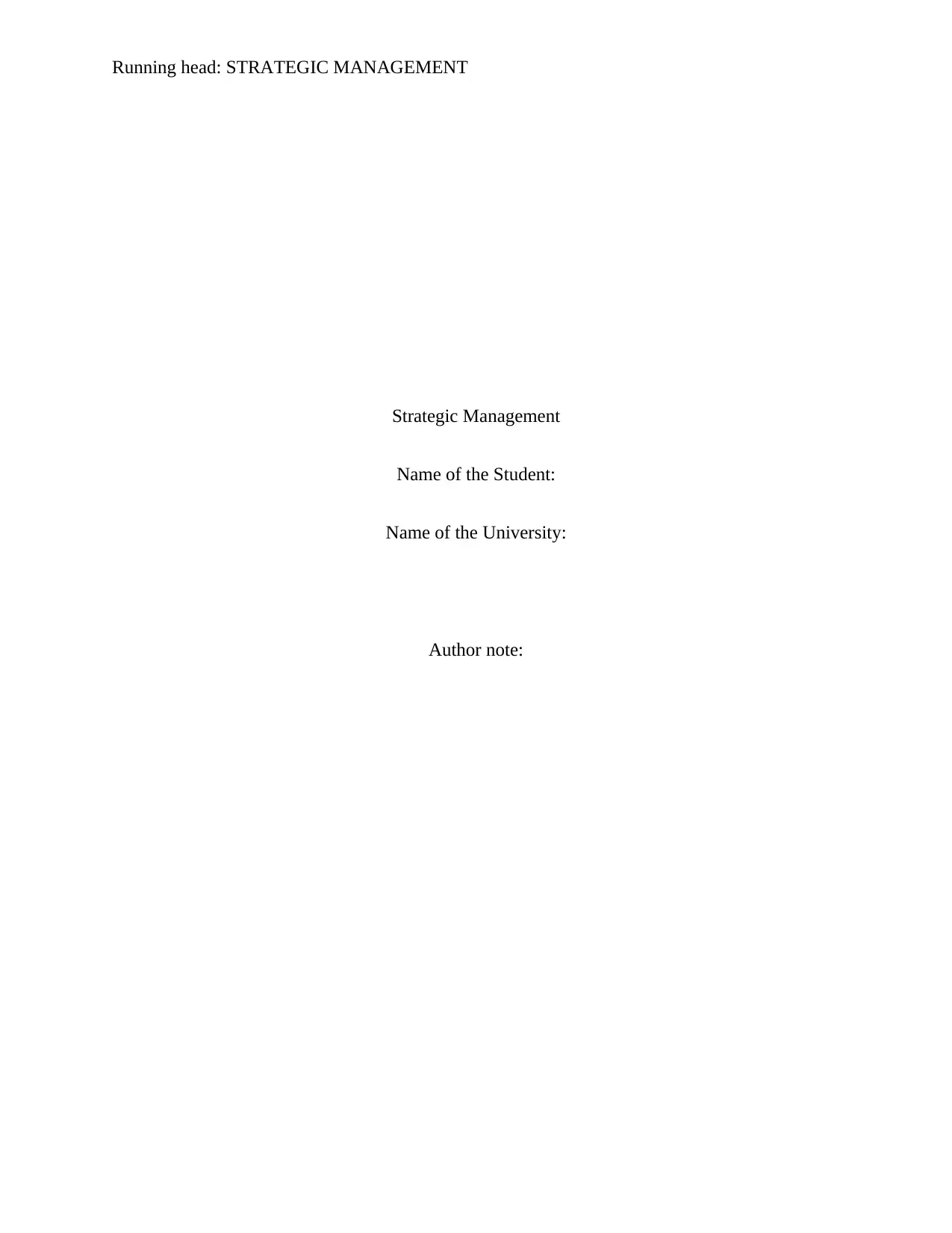
Running head: STRATEGIC MANAGEMENT
Strategic Management
Name of the Student:
Name of the University:
Author note:
Strategic Management
Name of the Student:
Name of the University:
Author note:
Paraphrase This Document
Need a fresh take? Get an instant paraphrase of this document with our AI Paraphraser
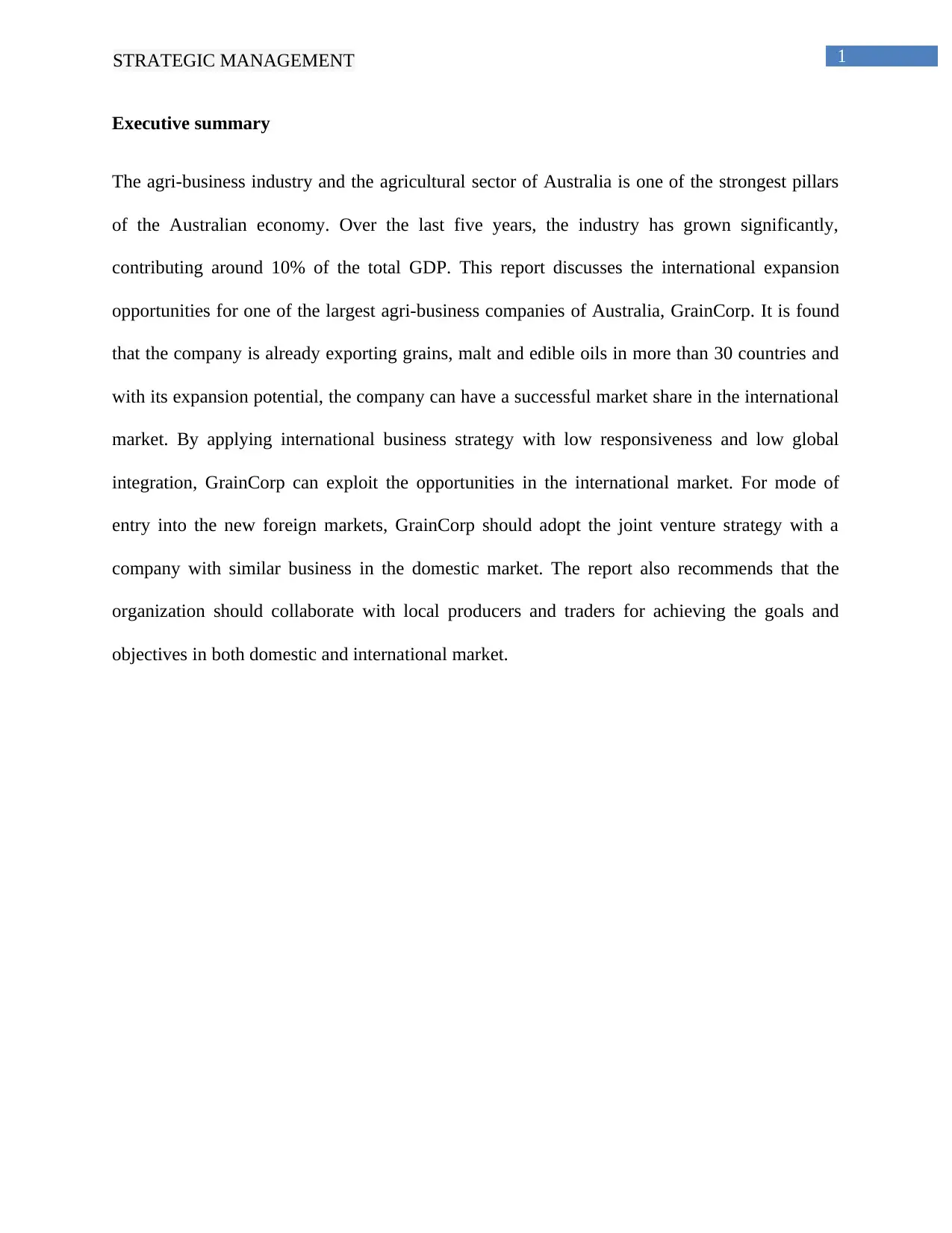
1STRATEGIC MANAGEMENT
Executive summary
The agri-business industry and the agricultural sector of Australia is one of the strongest pillars
of the Australian economy. Over the last five years, the industry has grown significantly,
contributing around 10% of the total GDP. This report discusses the international expansion
opportunities for one of the largest agri-business companies of Australia, GrainCorp. It is found
that the company is already exporting grains, malt and edible oils in more than 30 countries and
with its expansion potential, the company can have a successful market share in the international
market. By applying international business strategy with low responsiveness and low global
integration, GrainCorp can exploit the opportunities in the international market. For mode of
entry into the new foreign markets, GrainCorp should adopt the joint venture strategy with a
company with similar business in the domestic market. The report also recommends that the
organization should collaborate with local producers and traders for achieving the goals and
objectives in both domestic and international market.
Executive summary
The agri-business industry and the agricultural sector of Australia is one of the strongest pillars
of the Australian economy. Over the last five years, the industry has grown significantly,
contributing around 10% of the total GDP. This report discusses the international expansion
opportunities for one of the largest agri-business companies of Australia, GrainCorp. It is found
that the company is already exporting grains, malt and edible oils in more than 30 countries and
with its expansion potential, the company can have a successful market share in the international
market. By applying international business strategy with low responsiveness and low global
integration, GrainCorp can exploit the opportunities in the international market. For mode of
entry into the new foreign markets, GrainCorp should adopt the joint venture strategy with a
company with similar business in the domestic market. The report also recommends that the
organization should collaborate with local producers and traders for achieving the goals and
objectives in both domestic and international market.
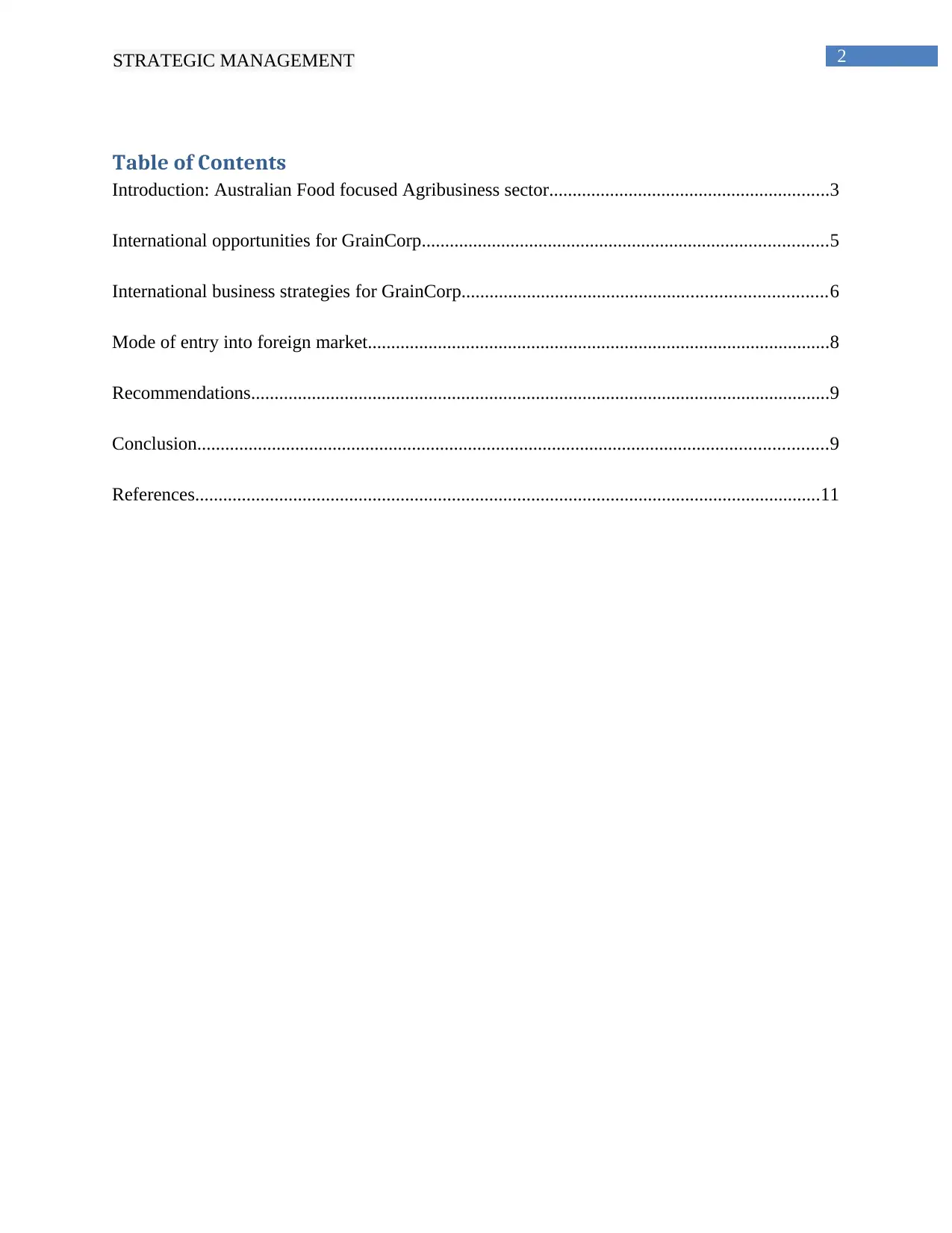
2STRATEGIC MANAGEMENT
Table of Contents
Introduction: Australian Food focused Agribusiness sector............................................................3
International opportunities for GrainCorp.......................................................................................5
International business strategies for GrainCorp..............................................................................6
Mode of entry into foreign market...................................................................................................8
Recommendations............................................................................................................................9
Conclusion.......................................................................................................................................9
References......................................................................................................................................11
Table of Contents
Introduction: Australian Food focused Agribusiness sector............................................................3
International opportunities for GrainCorp.......................................................................................5
International business strategies for GrainCorp..............................................................................6
Mode of entry into foreign market...................................................................................................8
Recommendations............................................................................................................................9
Conclusion.......................................................................................................................................9
References......................................................................................................................................11
⊘ This is a preview!⊘
Do you want full access?
Subscribe today to unlock all pages.

Trusted by 1+ million students worldwide
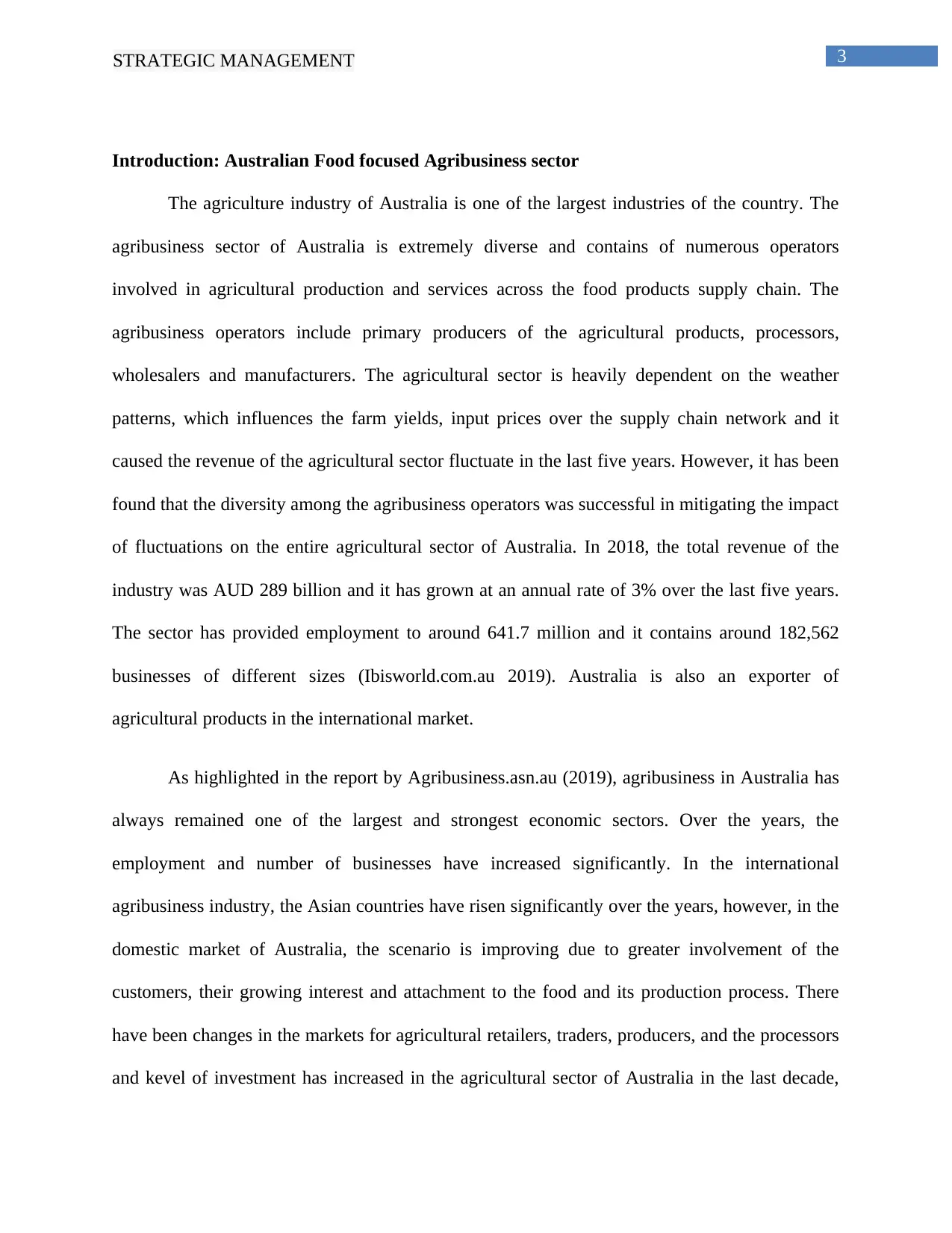
3STRATEGIC MANAGEMENT
Introduction: Australian Food focused Agribusiness sector
The agriculture industry of Australia is one of the largest industries of the country. The
agribusiness sector of Australia is extremely diverse and contains of numerous operators
involved in agricultural production and services across the food products supply chain. The
agribusiness operators include primary producers of the agricultural products, processors,
wholesalers and manufacturers. The agricultural sector is heavily dependent on the weather
patterns, which influences the farm yields, input prices over the supply chain network and it
caused the revenue of the agricultural sector fluctuate in the last five years. However, it has been
found that the diversity among the agribusiness operators was successful in mitigating the impact
of fluctuations on the entire agricultural sector of Australia. In 2018, the total revenue of the
industry was AUD 289 billion and it has grown at an annual rate of 3% over the last five years.
The sector has provided employment to around 641.7 million and it contains around 182,562
businesses of different sizes (Ibisworld.com.au 2019). Australia is also an exporter of
agricultural products in the international market.
As highlighted in the report by Agribusiness.asn.au (2019), agribusiness in Australia has
always remained one of the largest and strongest economic sectors. Over the years, the
employment and number of businesses have increased significantly. In the international
agribusiness industry, the Asian countries have risen significantly over the years, however, in the
domestic market of Australia, the scenario is improving due to greater involvement of the
customers, their growing interest and attachment to the food and its production process. There
have been changes in the markets for agricultural retailers, traders, producers, and the processors
and kevel of investment has increased in the agricultural sector of Australia in the last decade,
Introduction: Australian Food focused Agribusiness sector
The agriculture industry of Australia is one of the largest industries of the country. The
agribusiness sector of Australia is extremely diverse and contains of numerous operators
involved in agricultural production and services across the food products supply chain. The
agribusiness operators include primary producers of the agricultural products, processors,
wholesalers and manufacturers. The agricultural sector is heavily dependent on the weather
patterns, which influences the farm yields, input prices over the supply chain network and it
caused the revenue of the agricultural sector fluctuate in the last five years. However, it has been
found that the diversity among the agribusiness operators was successful in mitigating the impact
of fluctuations on the entire agricultural sector of Australia. In 2018, the total revenue of the
industry was AUD 289 billion and it has grown at an annual rate of 3% over the last five years.
The sector has provided employment to around 641.7 million and it contains around 182,562
businesses of different sizes (Ibisworld.com.au 2019). Australia is also an exporter of
agricultural products in the international market.
As highlighted in the report by Agribusiness.asn.au (2019), agribusiness in Australia has
always remained one of the largest and strongest economic sectors. Over the years, the
employment and number of businesses have increased significantly. In the international
agribusiness industry, the Asian countries have risen significantly over the years, however, in the
domestic market of Australia, the scenario is improving due to greater involvement of the
customers, their growing interest and attachment to the food and its production process. There
have been changes in the markets for agricultural retailers, traders, producers, and the processors
and kevel of investment has increased in the agricultural sector of Australia in the last decade,
Paraphrase This Document
Need a fresh take? Get an instant paraphrase of this document with our AI Paraphraser
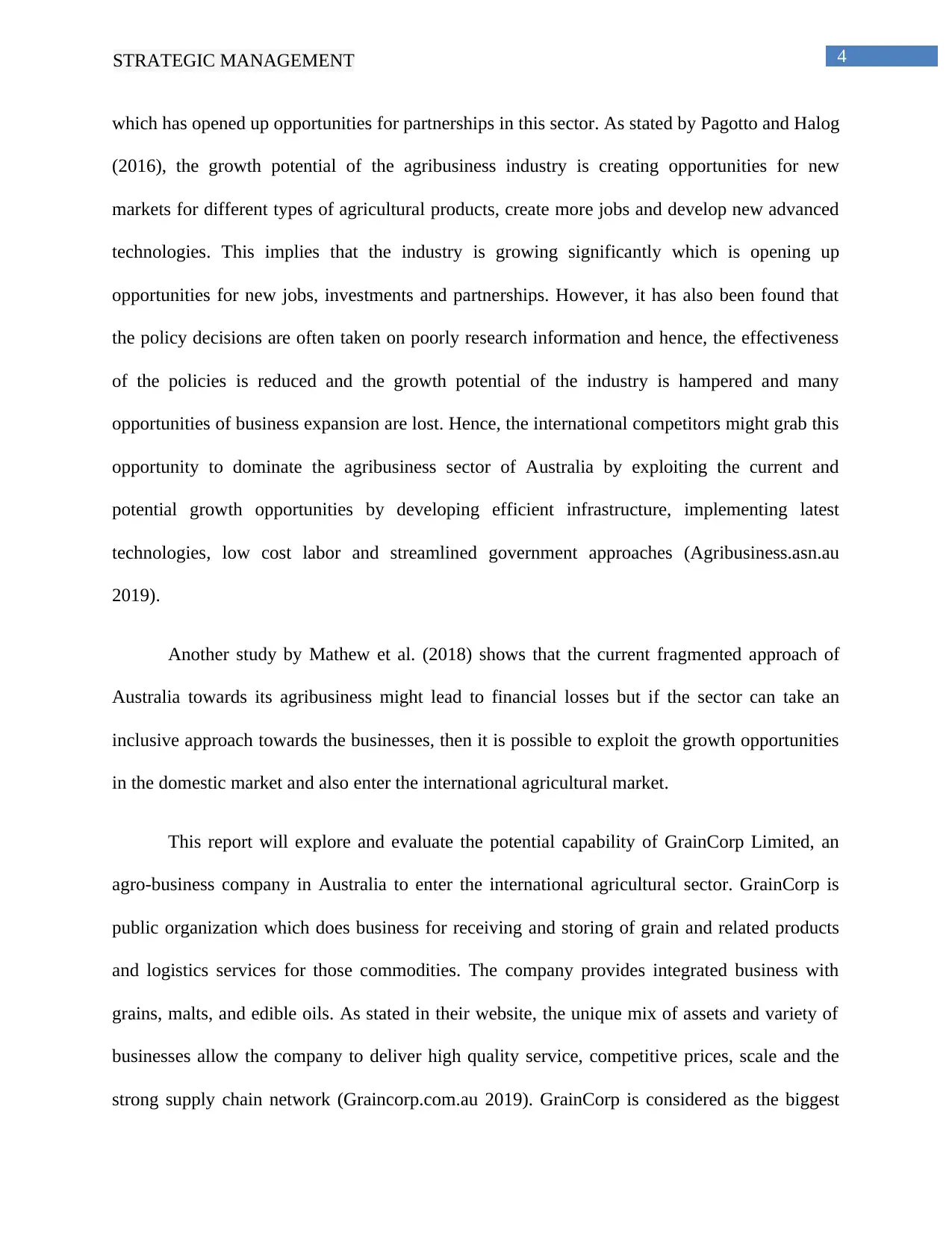
4STRATEGIC MANAGEMENT
which has opened up opportunities for partnerships in this sector. As stated by Pagotto and Halog
(2016), the growth potential of the agribusiness industry is creating opportunities for new
markets for different types of agricultural products, create more jobs and develop new advanced
technologies. This implies that the industry is growing significantly which is opening up
opportunities for new jobs, investments and partnerships. However, it has also been found that
the policy decisions are often taken on poorly research information and hence, the effectiveness
of the policies is reduced and the growth potential of the industry is hampered and many
opportunities of business expansion are lost. Hence, the international competitors might grab this
opportunity to dominate the agribusiness sector of Australia by exploiting the current and
potential growth opportunities by developing efficient infrastructure, implementing latest
technologies, low cost labor and streamlined government approaches (Agribusiness.asn.au
2019).
Another study by Mathew et al. (2018) shows that the current fragmented approach of
Australia towards its agribusiness might lead to financial losses but if the sector can take an
inclusive approach towards the businesses, then it is possible to exploit the growth opportunities
in the domestic market and also enter the international agricultural market.
This report will explore and evaluate the potential capability of GrainCorp Limited, an
agro-business company in Australia to enter the international agricultural sector. GrainCorp is
public organization which does business for receiving and storing of grain and related products
and logistics services for those commodities. The company provides integrated business with
grains, malts, and edible oils. As stated in their website, the unique mix of assets and variety of
businesses allow the company to deliver high quality service, competitive prices, scale and the
strong supply chain network (Graincorp.com.au 2019). GrainCorp is considered as the biggest
which has opened up opportunities for partnerships in this sector. As stated by Pagotto and Halog
(2016), the growth potential of the agribusiness industry is creating opportunities for new
markets for different types of agricultural products, create more jobs and develop new advanced
technologies. This implies that the industry is growing significantly which is opening up
opportunities for new jobs, investments and partnerships. However, it has also been found that
the policy decisions are often taken on poorly research information and hence, the effectiveness
of the policies is reduced and the growth potential of the industry is hampered and many
opportunities of business expansion are lost. Hence, the international competitors might grab this
opportunity to dominate the agribusiness sector of Australia by exploiting the current and
potential growth opportunities by developing efficient infrastructure, implementing latest
technologies, low cost labor and streamlined government approaches (Agribusiness.asn.au
2019).
Another study by Mathew et al. (2018) shows that the current fragmented approach of
Australia towards its agribusiness might lead to financial losses but if the sector can take an
inclusive approach towards the businesses, then it is possible to exploit the growth opportunities
in the domestic market and also enter the international agricultural market.
This report will explore and evaluate the potential capability of GrainCorp Limited, an
agro-business company in Australia to enter the international agricultural sector. GrainCorp is
public organization which does business for receiving and storing of grain and related products
and logistics services for those commodities. The company provides integrated business with
grains, malts, and edible oils. As stated in their website, the unique mix of assets and variety of
businesses allow the company to deliver high quality service, competitive prices, scale and the
strong supply chain network (Graincorp.com.au 2019). GrainCorp is considered as the biggest
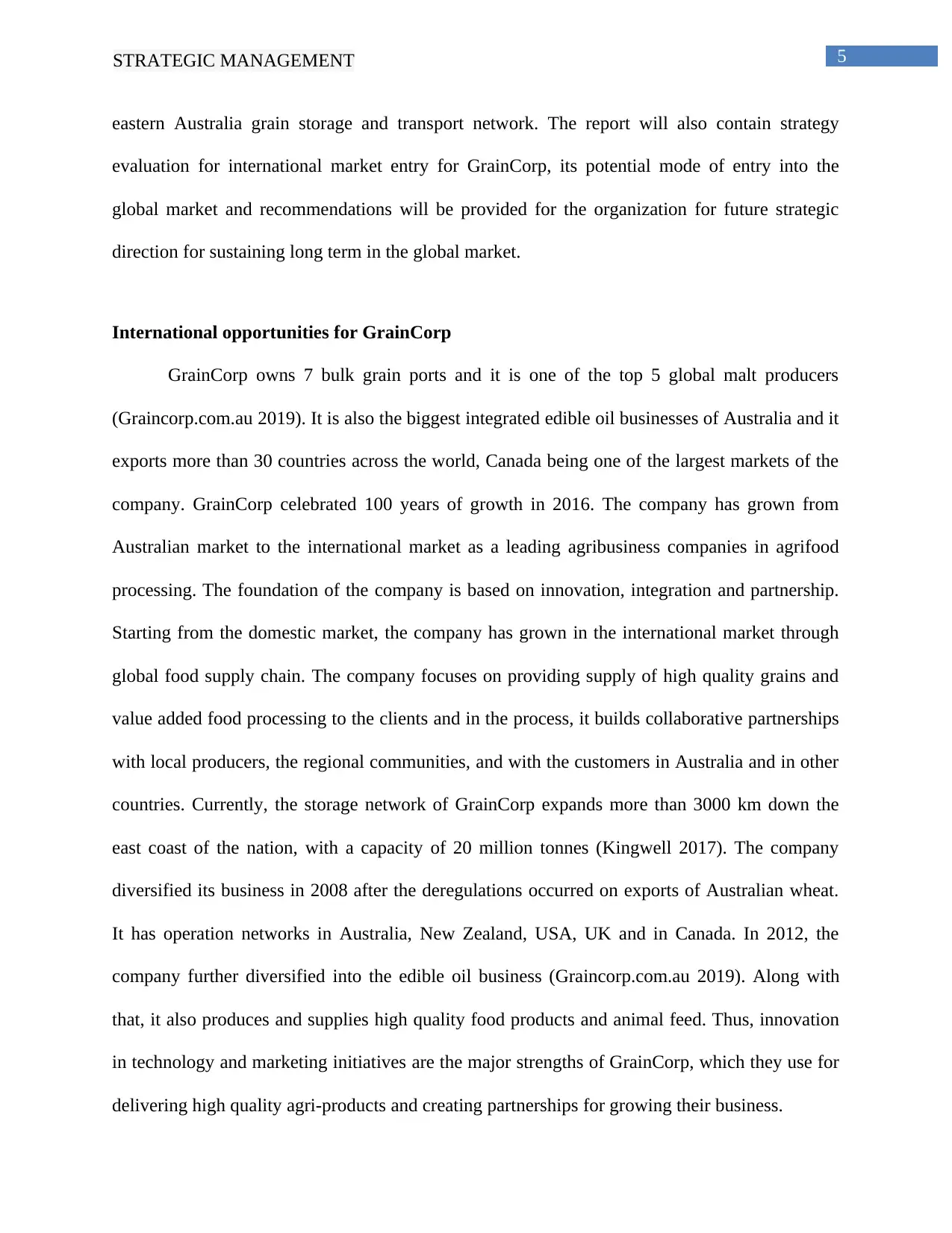
5STRATEGIC MANAGEMENT
eastern Australia grain storage and transport network. The report will also contain strategy
evaluation for international market entry for GrainCorp, its potential mode of entry into the
global market and recommendations will be provided for the organization for future strategic
direction for sustaining long term in the global market.
International opportunities for GrainCorp
GrainCorp owns 7 bulk grain ports and it is one of the top 5 global malt producers
(Graincorp.com.au 2019). It is also the biggest integrated edible oil businesses of Australia and it
exports more than 30 countries across the world, Canada being one of the largest markets of the
company. GrainCorp celebrated 100 years of growth in 2016. The company has grown from
Australian market to the international market as a leading agribusiness companies in agrifood
processing. The foundation of the company is based on innovation, integration and partnership.
Starting from the domestic market, the company has grown in the international market through
global food supply chain. The company focuses on providing supply of high quality grains and
value added food processing to the clients and in the process, it builds collaborative partnerships
with local producers, the regional communities, and with the customers in Australia and in other
countries. Currently, the storage network of GrainCorp expands more than 3000 km down the
east coast of the nation, with a capacity of 20 million tonnes (Kingwell 2017). The company
diversified its business in 2008 after the deregulations occurred on exports of Australian wheat.
It has operation networks in Australia, New Zealand, USA, UK and in Canada. In 2012, the
company further diversified into the edible oil business (Graincorp.com.au 2019). Along with
that, it also produces and supplies high quality food products and animal feed. Thus, innovation
in technology and marketing initiatives are the major strengths of GrainCorp, which they use for
delivering high quality agri-products and creating partnerships for growing their business.
eastern Australia grain storage and transport network. The report will also contain strategy
evaluation for international market entry for GrainCorp, its potential mode of entry into the
global market and recommendations will be provided for the organization for future strategic
direction for sustaining long term in the global market.
International opportunities for GrainCorp
GrainCorp owns 7 bulk grain ports and it is one of the top 5 global malt producers
(Graincorp.com.au 2019). It is also the biggest integrated edible oil businesses of Australia and it
exports more than 30 countries across the world, Canada being one of the largest markets of the
company. GrainCorp celebrated 100 years of growth in 2016. The company has grown from
Australian market to the international market as a leading agribusiness companies in agrifood
processing. The foundation of the company is based on innovation, integration and partnership.
Starting from the domestic market, the company has grown in the international market through
global food supply chain. The company focuses on providing supply of high quality grains and
value added food processing to the clients and in the process, it builds collaborative partnerships
with local producers, the regional communities, and with the customers in Australia and in other
countries. Currently, the storage network of GrainCorp expands more than 3000 km down the
east coast of the nation, with a capacity of 20 million tonnes (Kingwell 2017). The company
diversified its business in 2008 after the deregulations occurred on exports of Australian wheat.
It has operation networks in Australia, New Zealand, USA, UK and in Canada. In 2012, the
company further diversified into the edible oil business (Graincorp.com.au 2019). Along with
that, it also produces and supplies high quality food products and animal feed. Thus, innovation
in technology and marketing initiatives are the major strengths of GrainCorp, which they use for
delivering high quality agri-products and creating partnerships for growing their business.
⊘ This is a preview!⊘
Do you want full access?
Subscribe today to unlock all pages.

Trusted by 1+ million students worldwide
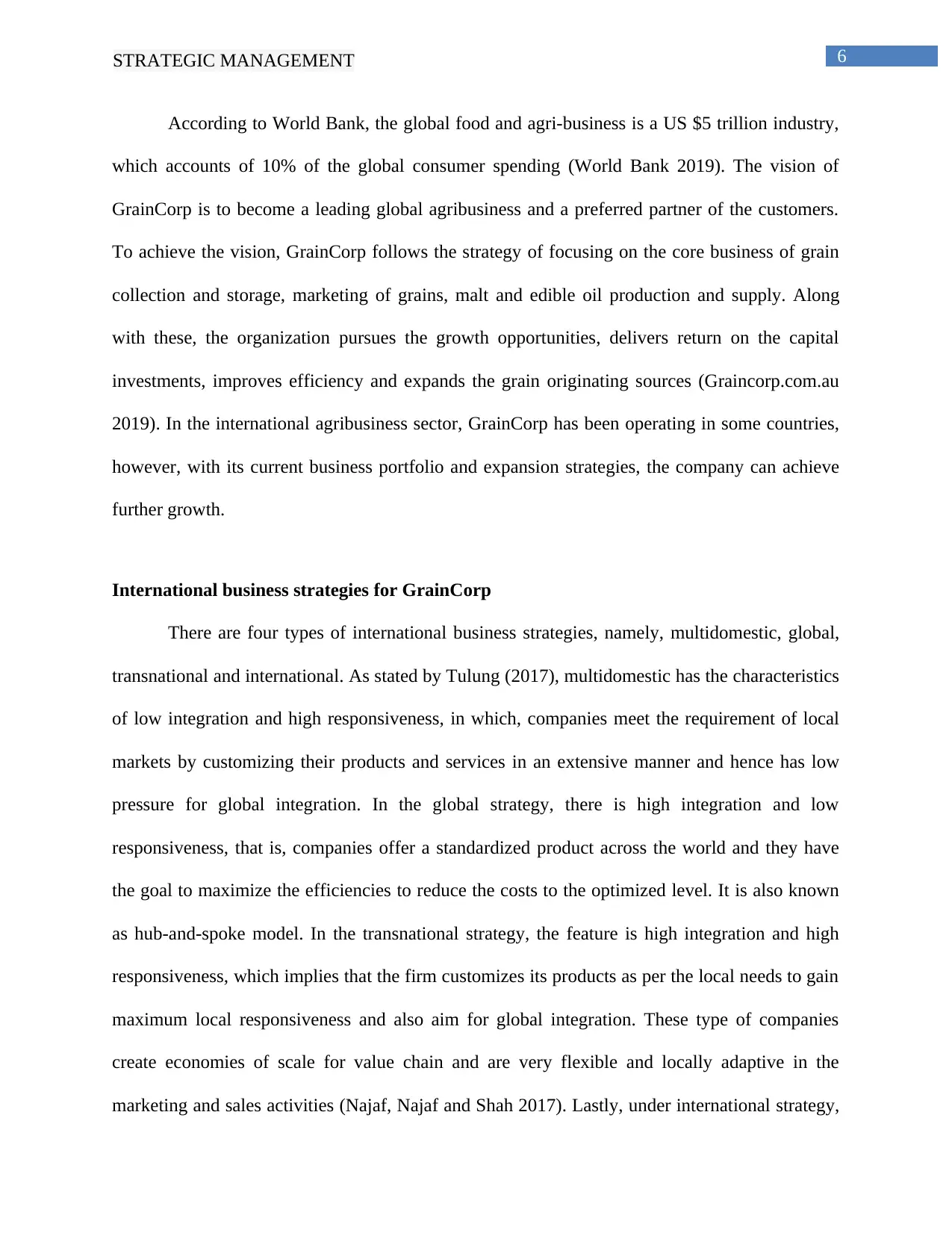
6STRATEGIC MANAGEMENT
According to World Bank, the global food and agri-business is a US $5 trillion industry,
which accounts of 10% of the global consumer spending (World Bank 2019). The vision of
GrainCorp is to become a leading global agribusiness and a preferred partner of the customers.
To achieve the vision, GrainCorp follows the strategy of focusing on the core business of grain
collection and storage, marketing of grains, malt and edible oil production and supply. Along
with these, the organization pursues the growth opportunities, delivers return on the capital
investments, improves efficiency and expands the grain originating sources (Graincorp.com.au
2019). In the international agribusiness sector, GrainCorp has been operating in some countries,
however, with its current business portfolio and expansion strategies, the company can achieve
further growth.
International business strategies for GrainCorp
There are four types of international business strategies, namely, multidomestic, global,
transnational and international. As stated by Tulung (2017), multidomestic has the characteristics
of low integration and high responsiveness, in which, companies meet the requirement of local
markets by customizing their products and services in an extensive manner and hence has low
pressure for global integration. In the global strategy, there is high integration and low
responsiveness, that is, companies offer a standardized product across the world and they have
the goal to maximize the efficiencies to reduce the costs to the optimized level. It is also known
as hub-and-spoke model. In the transnational strategy, the feature is high integration and high
responsiveness, which implies that the firm customizes its products as per the local needs to gain
maximum local responsiveness and also aim for global integration. These type of companies
create economies of scale for value chain and are very flexible and locally adaptive in the
marketing and sales activities (Najaf, Najaf and Shah 2017). Lastly, under international strategy,
According to World Bank, the global food and agri-business is a US $5 trillion industry,
which accounts of 10% of the global consumer spending (World Bank 2019). The vision of
GrainCorp is to become a leading global agribusiness and a preferred partner of the customers.
To achieve the vision, GrainCorp follows the strategy of focusing on the core business of grain
collection and storage, marketing of grains, malt and edible oil production and supply. Along
with these, the organization pursues the growth opportunities, delivers return on the capital
investments, improves efficiency and expands the grain originating sources (Graincorp.com.au
2019). In the international agribusiness sector, GrainCorp has been operating in some countries,
however, with its current business portfolio and expansion strategies, the company can achieve
further growth.
International business strategies for GrainCorp
There are four types of international business strategies, namely, multidomestic, global,
transnational and international. As stated by Tulung (2017), multidomestic has the characteristics
of low integration and high responsiveness, in which, companies meet the requirement of local
markets by customizing their products and services in an extensive manner and hence has low
pressure for global integration. In the global strategy, there is high integration and low
responsiveness, that is, companies offer a standardized product across the world and they have
the goal to maximize the efficiencies to reduce the costs to the optimized level. It is also known
as hub-and-spoke model. In the transnational strategy, the feature is high integration and high
responsiveness, which implies that the firm customizes its products as per the local needs to gain
maximum local responsiveness and also aim for global integration. These type of companies
create economies of scale for value chain and are very flexible and locally adaptive in the
marketing and sales activities (Najaf, Najaf and Shah 2017). Lastly, under international strategy,
Paraphrase This Document
Need a fresh take? Get an instant paraphrase of this document with our AI Paraphraser
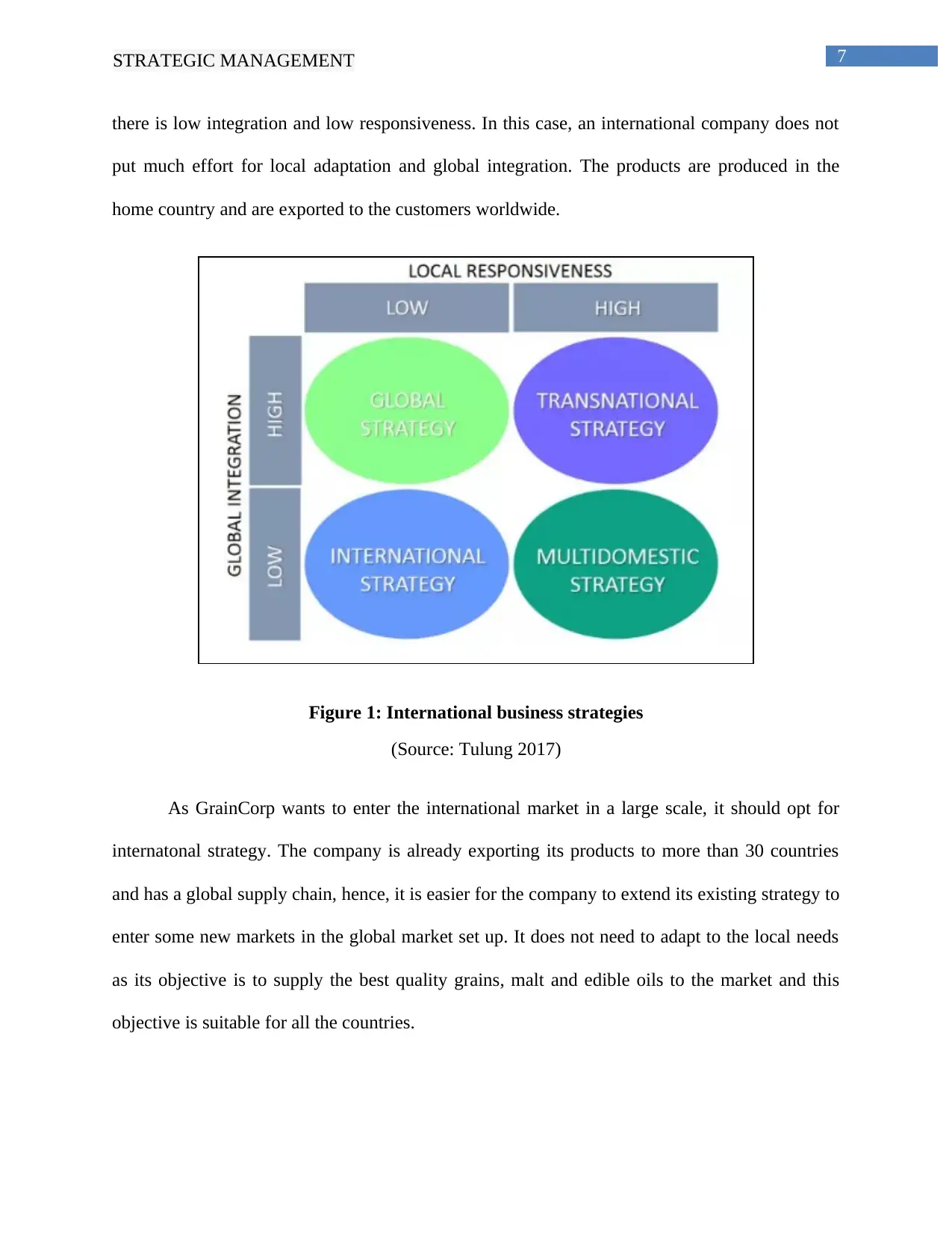
7STRATEGIC MANAGEMENT
there is low integration and low responsiveness. In this case, an international company does not
put much effort for local adaptation and global integration. The products are produced in the
home country and are exported to the customers worldwide.
Figure 1: International business strategies
(Source: Tulung 2017)
As GrainCorp wants to enter the international market in a large scale, it should opt for
internatonal strategy. The company is already exporting its products to more than 30 countries
and has a global supply chain, hence, it is easier for the company to extend its existing strategy to
enter some new markets in the global market set up. It does not need to adapt to the local needs
as its objective is to supply the best quality grains, malt and edible oils to the market and this
objective is suitable for all the countries.
there is low integration and low responsiveness. In this case, an international company does not
put much effort for local adaptation and global integration. The products are produced in the
home country and are exported to the customers worldwide.
Figure 1: International business strategies
(Source: Tulung 2017)
As GrainCorp wants to enter the international market in a large scale, it should opt for
internatonal strategy. The company is already exporting its products to more than 30 countries
and has a global supply chain, hence, it is easier for the company to extend its existing strategy to
enter some new markets in the global market set up. It does not need to adapt to the local needs
as its objective is to supply the best quality grains, malt and edible oils to the market and this
objective is suitable for all the countries.
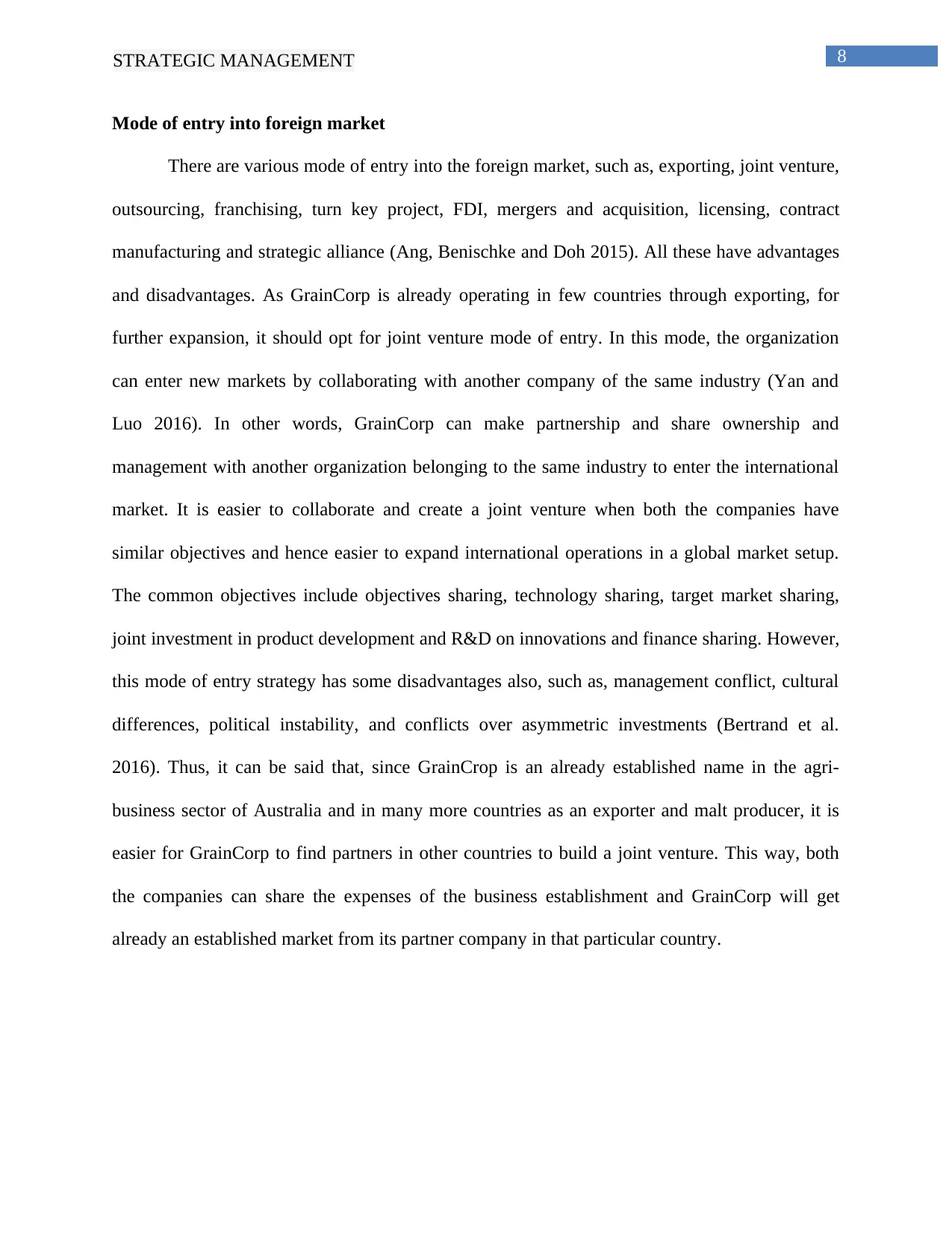
8STRATEGIC MANAGEMENT
Mode of entry into foreign market
There are various mode of entry into the foreign market, such as, exporting, joint venture,
outsourcing, franchising, turn key project, FDI, mergers and acquisition, licensing, contract
manufacturing and strategic alliance (Ang, Benischke and Doh 2015). All these have advantages
and disadvantages. As GrainCorp is already operating in few countries through exporting, for
further expansion, it should opt for joint venture mode of entry. In this mode, the organization
can enter new markets by collaborating with another company of the same industry (Yan and
Luo 2016). In other words, GrainCorp can make partnership and share ownership and
management with another organization belonging to the same industry to enter the international
market. It is easier to collaborate and create a joint venture when both the companies have
similar objectives and hence easier to expand international operations in a global market setup.
The common objectives include objectives sharing, technology sharing, target market sharing,
joint investment in product development and R&D on innovations and finance sharing. However,
this mode of entry strategy has some disadvantages also, such as, management conflict, cultural
differences, political instability, and conflicts over asymmetric investments (Bertrand et al.
2016). Thus, it can be said that, since GrainCrop is an already established name in the agri-
business sector of Australia and in many more countries as an exporter and malt producer, it is
easier for GrainCorp to find partners in other countries to build a joint venture. This way, both
the companies can share the expenses of the business establishment and GrainCorp will get
already an established market from its partner company in that particular country.
Mode of entry into foreign market
There are various mode of entry into the foreign market, such as, exporting, joint venture,
outsourcing, franchising, turn key project, FDI, mergers and acquisition, licensing, contract
manufacturing and strategic alliance (Ang, Benischke and Doh 2015). All these have advantages
and disadvantages. As GrainCorp is already operating in few countries through exporting, for
further expansion, it should opt for joint venture mode of entry. In this mode, the organization
can enter new markets by collaborating with another company of the same industry (Yan and
Luo 2016). In other words, GrainCorp can make partnership and share ownership and
management with another organization belonging to the same industry to enter the international
market. It is easier to collaborate and create a joint venture when both the companies have
similar objectives and hence easier to expand international operations in a global market setup.
The common objectives include objectives sharing, technology sharing, target market sharing,
joint investment in product development and R&D on innovations and finance sharing. However,
this mode of entry strategy has some disadvantages also, such as, management conflict, cultural
differences, political instability, and conflicts over asymmetric investments (Bertrand et al.
2016). Thus, it can be said that, since GrainCrop is an already established name in the agri-
business sector of Australia and in many more countries as an exporter and malt producer, it is
easier for GrainCorp to find partners in other countries to build a joint venture. This way, both
the companies can share the expenses of the business establishment and GrainCorp will get
already an established market from its partner company in that particular country.
⊘ This is a preview!⊘
Do you want full access?
Subscribe today to unlock all pages.

Trusted by 1+ million students worldwide
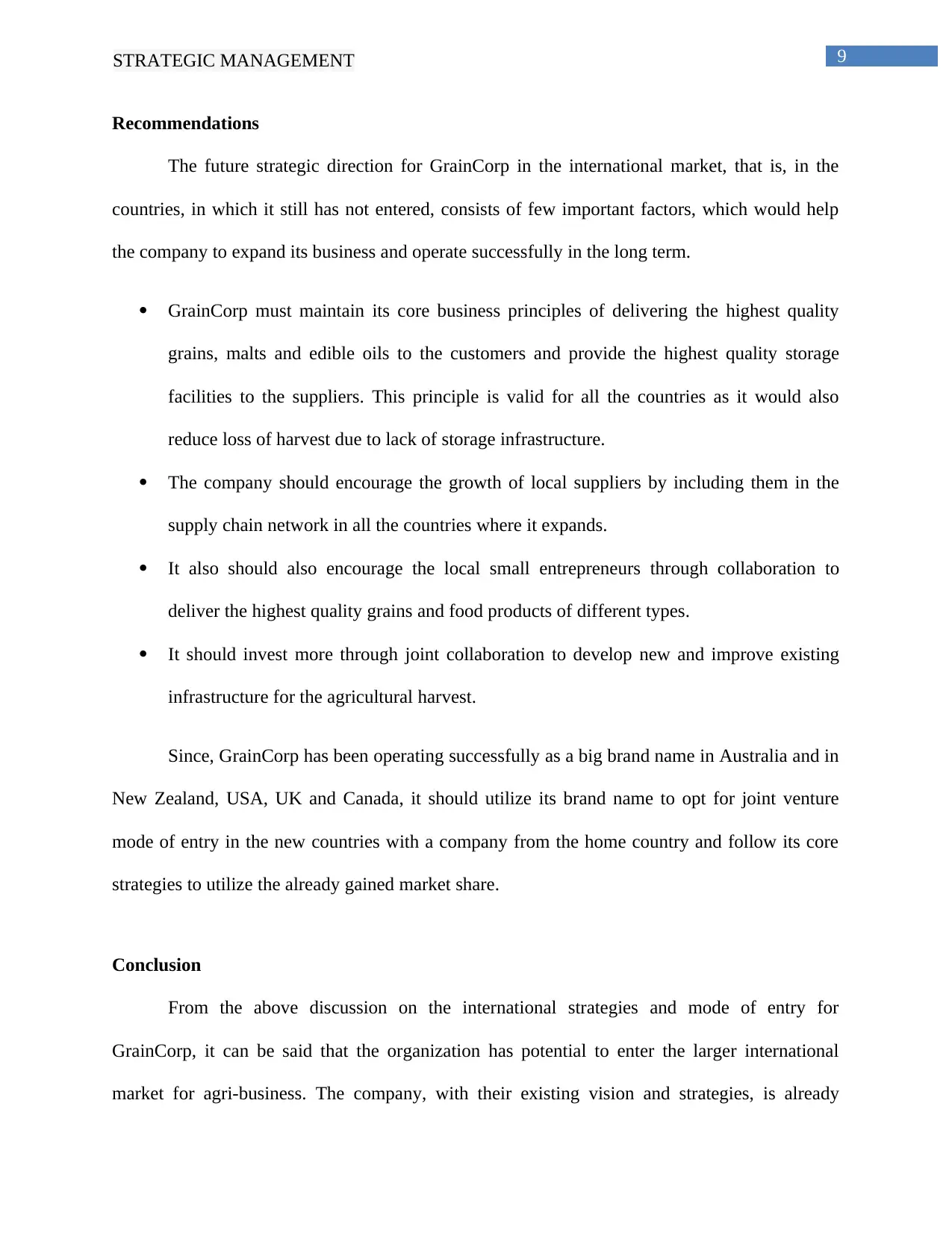
9STRATEGIC MANAGEMENT
Recommendations
The future strategic direction for GrainCorp in the international market, that is, in the
countries, in which it still has not entered, consists of few important factors, which would help
the company to expand its business and operate successfully in the long term.
GrainCorp must maintain its core business principles of delivering the highest quality
grains, malts and edible oils to the customers and provide the highest quality storage
facilities to the suppliers. This principle is valid for all the countries as it would also
reduce loss of harvest due to lack of storage infrastructure.
The company should encourage the growth of local suppliers by including them in the
supply chain network in all the countries where it expands.
It also should also encourage the local small entrepreneurs through collaboration to
deliver the highest quality grains and food products of different types.
It should invest more through joint collaboration to develop new and improve existing
infrastructure for the agricultural harvest.
Since, GrainCorp has been operating successfully as a big brand name in Australia and in
New Zealand, USA, UK and Canada, it should utilize its brand name to opt for joint venture
mode of entry in the new countries with a company from the home country and follow its core
strategies to utilize the already gained market share.
Conclusion
From the above discussion on the international strategies and mode of entry for
GrainCorp, it can be said that the organization has potential to enter the larger international
market for agri-business. The company, with their existing vision and strategies, is already
Recommendations
The future strategic direction for GrainCorp in the international market, that is, in the
countries, in which it still has not entered, consists of few important factors, which would help
the company to expand its business and operate successfully in the long term.
GrainCorp must maintain its core business principles of delivering the highest quality
grains, malts and edible oils to the customers and provide the highest quality storage
facilities to the suppliers. This principle is valid for all the countries as it would also
reduce loss of harvest due to lack of storage infrastructure.
The company should encourage the growth of local suppliers by including them in the
supply chain network in all the countries where it expands.
It also should also encourage the local small entrepreneurs through collaboration to
deliver the highest quality grains and food products of different types.
It should invest more through joint collaboration to develop new and improve existing
infrastructure for the agricultural harvest.
Since, GrainCorp has been operating successfully as a big brand name in Australia and in
New Zealand, USA, UK and Canada, it should utilize its brand name to opt for joint venture
mode of entry in the new countries with a company from the home country and follow its core
strategies to utilize the already gained market share.
Conclusion
From the above discussion on the international strategies and mode of entry for
GrainCorp, it can be said that the organization has potential to enter the larger international
market for agri-business. The company, with their existing vision and strategies, is already
Paraphrase This Document
Need a fresh take? Get an instant paraphrase of this document with our AI Paraphraser
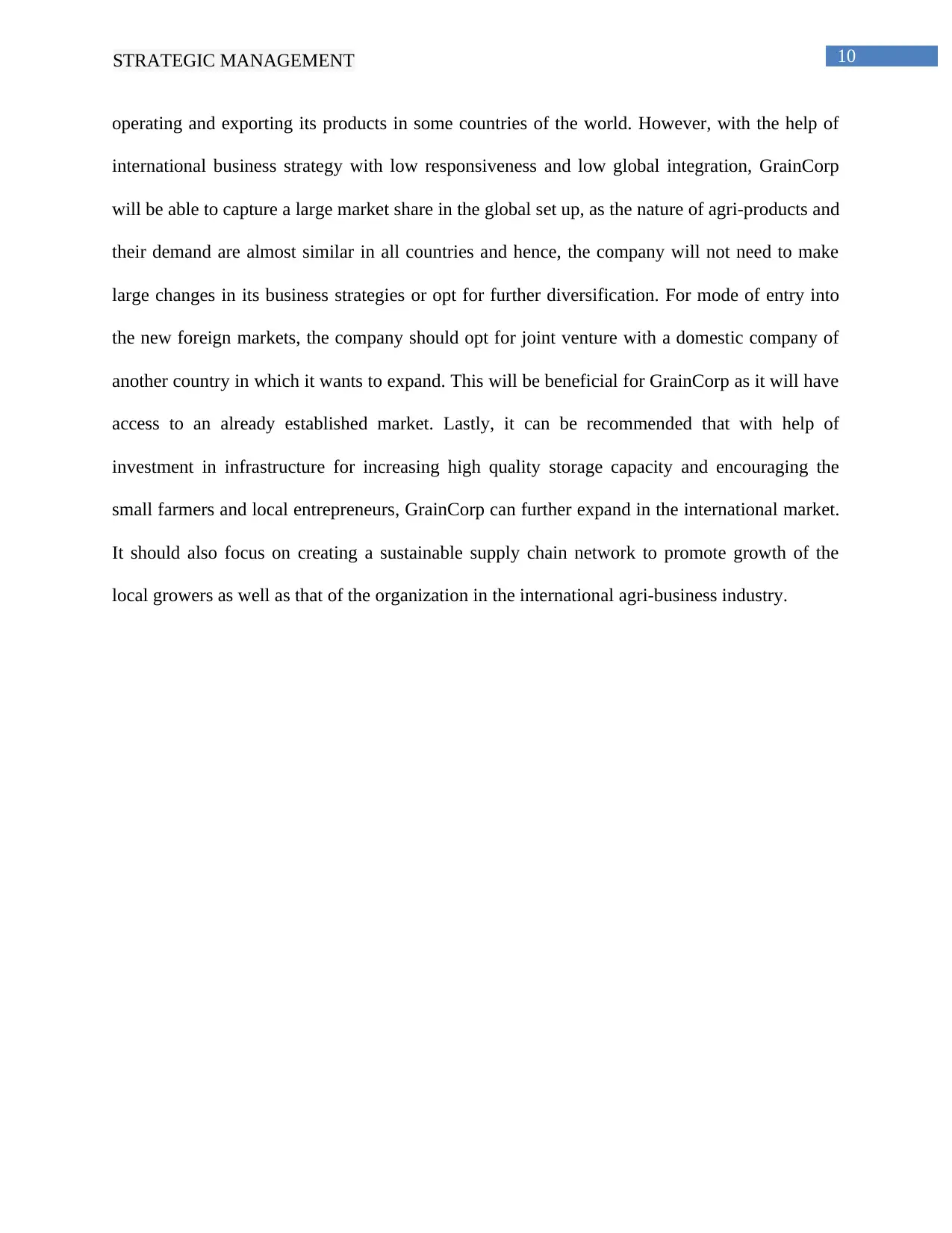
10STRATEGIC MANAGEMENT
operating and exporting its products in some countries of the world. However, with the help of
international business strategy with low responsiveness and low global integration, GrainCorp
will be able to capture a large market share in the global set up, as the nature of agri-products and
their demand are almost similar in all countries and hence, the company will not need to make
large changes in its business strategies or opt for further diversification. For mode of entry into
the new foreign markets, the company should opt for joint venture with a domestic company of
another country in which it wants to expand. This will be beneficial for GrainCorp as it will have
access to an already established market. Lastly, it can be recommended that with help of
investment in infrastructure for increasing high quality storage capacity and encouraging the
small farmers and local entrepreneurs, GrainCorp can further expand in the international market.
It should also focus on creating a sustainable supply chain network to promote growth of the
local growers as well as that of the organization in the international agri-business industry.
operating and exporting its products in some countries of the world. However, with the help of
international business strategy with low responsiveness and low global integration, GrainCorp
will be able to capture a large market share in the global set up, as the nature of agri-products and
their demand are almost similar in all countries and hence, the company will not need to make
large changes in its business strategies or opt for further diversification. For mode of entry into
the new foreign markets, the company should opt for joint venture with a domestic company of
another country in which it wants to expand. This will be beneficial for GrainCorp as it will have
access to an already established market. Lastly, it can be recommended that with help of
investment in infrastructure for increasing high quality storage capacity and encouraging the
small farmers and local entrepreneurs, GrainCorp can further expand in the international market.
It should also focus on creating a sustainable supply chain network to promote growth of the
local growers as well as that of the organization in the international agri-business industry.
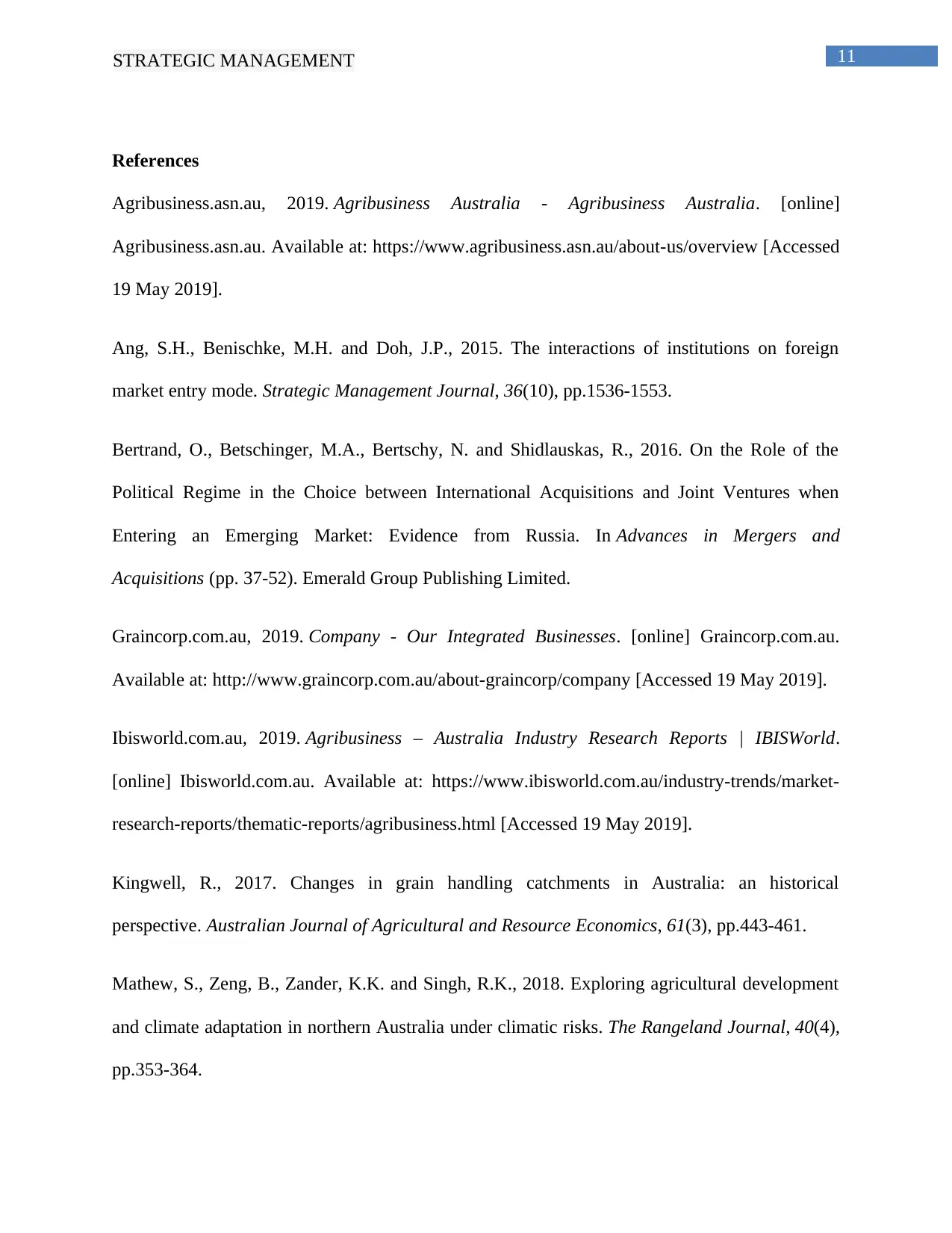
11STRATEGIC MANAGEMENT
References
Agribusiness.asn.au, 2019. Agribusiness Australia - Agribusiness Australia. [online]
Agribusiness.asn.au. Available at: https://www.agribusiness.asn.au/about-us/overview [Accessed
19 May 2019].
Ang, S.H., Benischke, M.H. and Doh, J.P., 2015. The interactions of institutions on foreign
market entry mode. Strategic Management Journal, 36(10), pp.1536-1553.
Bertrand, O., Betschinger, M.A., Bertschy, N. and Shidlauskas, R., 2016. On the Role of the
Political Regime in the Choice between International Acquisitions and Joint Ventures when
Entering an Emerging Market: Evidence from Russia. In Advances in Mergers and
Acquisitions (pp. 37-52). Emerald Group Publishing Limited.
Graincorp.com.au, 2019. Company - Our Integrated Businesses. [online] Graincorp.com.au.
Available at: http://www.graincorp.com.au/about-graincorp/company [Accessed 19 May 2019].
Ibisworld.com.au, 2019. Agribusiness – Australia Industry Research Reports | IBISWorld.
[online] Ibisworld.com.au. Available at: https://www.ibisworld.com.au/industry-trends/market-
research-reports/thematic-reports/agribusiness.html [Accessed 19 May 2019].
Kingwell, R., 2017. Changes in grain handling catchments in Australia: an historical
perspective. Australian Journal of Agricultural and Resource Economics, 61(3), pp.443-461.
Mathew, S., Zeng, B., Zander, K.K. and Singh, R.K., 2018. Exploring agricultural development
and climate adaptation in northern Australia under climatic risks. The Rangeland Journal, 40(4),
pp.353-364.
References
Agribusiness.asn.au, 2019. Agribusiness Australia - Agribusiness Australia. [online]
Agribusiness.asn.au. Available at: https://www.agribusiness.asn.au/about-us/overview [Accessed
19 May 2019].
Ang, S.H., Benischke, M.H. and Doh, J.P., 2015. The interactions of institutions on foreign
market entry mode. Strategic Management Journal, 36(10), pp.1536-1553.
Bertrand, O., Betschinger, M.A., Bertschy, N. and Shidlauskas, R., 2016. On the Role of the
Political Regime in the Choice between International Acquisitions and Joint Ventures when
Entering an Emerging Market: Evidence from Russia. In Advances in Mergers and
Acquisitions (pp. 37-52). Emerald Group Publishing Limited.
Graincorp.com.au, 2019. Company - Our Integrated Businesses. [online] Graincorp.com.au.
Available at: http://www.graincorp.com.au/about-graincorp/company [Accessed 19 May 2019].
Ibisworld.com.au, 2019. Agribusiness – Australia Industry Research Reports | IBISWorld.
[online] Ibisworld.com.au. Available at: https://www.ibisworld.com.au/industry-trends/market-
research-reports/thematic-reports/agribusiness.html [Accessed 19 May 2019].
Kingwell, R., 2017. Changes in grain handling catchments in Australia: an historical
perspective. Australian Journal of Agricultural and Resource Economics, 61(3), pp.443-461.
Mathew, S., Zeng, B., Zander, K.K. and Singh, R.K., 2018. Exploring agricultural development
and climate adaptation in northern Australia under climatic risks. The Rangeland Journal, 40(4),
pp.353-364.
⊘ This is a preview!⊘
Do you want full access?
Subscribe today to unlock all pages.

Trusted by 1+ million students worldwide
1 out of 13
Related Documents
Your All-in-One AI-Powered Toolkit for Academic Success.
+13062052269
info@desklib.com
Available 24*7 on WhatsApp / Email
![[object Object]](/_next/static/media/star-bottom.7253800d.svg)
Unlock your academic potential
Copyright © 2020–2026 A2Z Services. All Rights Reserved. Developed and managed by ZUCOL.





